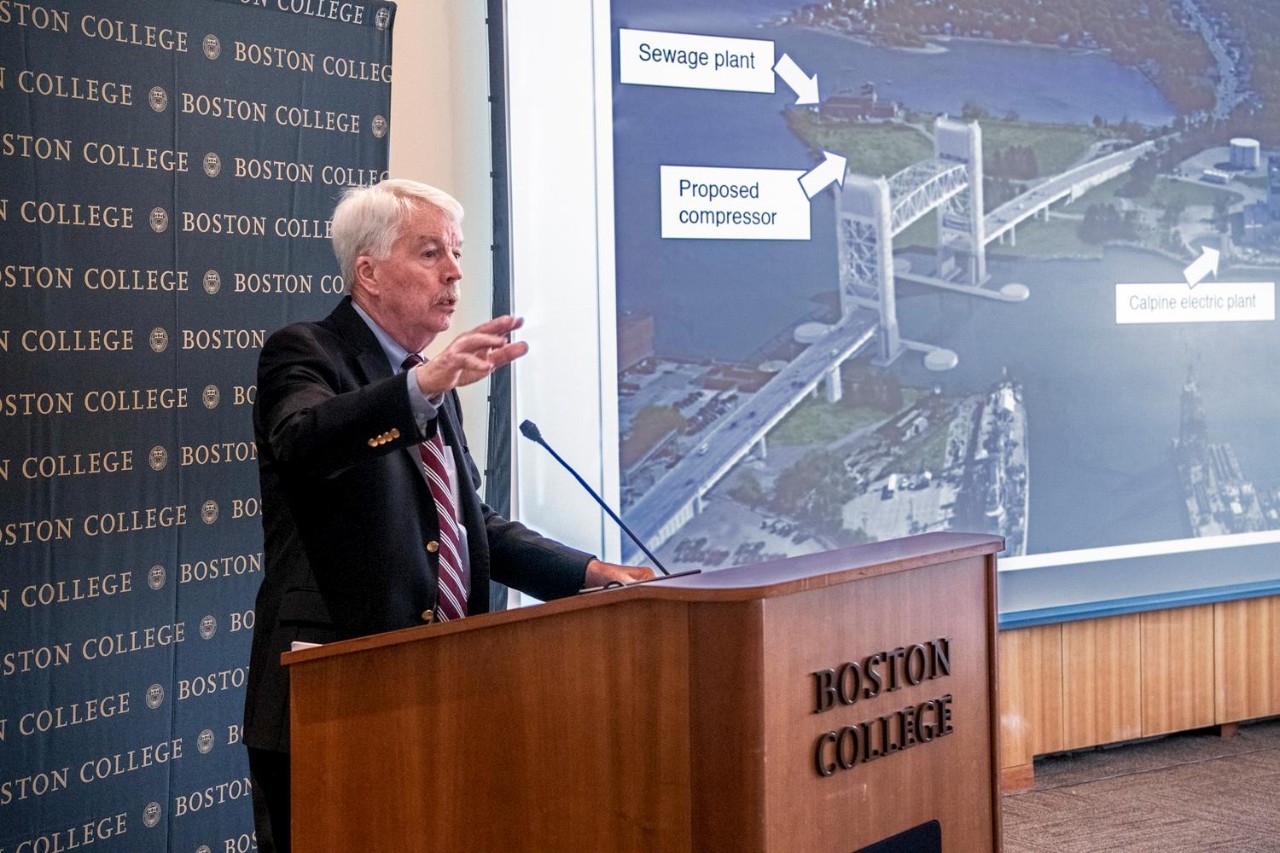Philip J. Landrigan, M.D., a pediatrician, public health physician and director of Boston College's Global Public Health Program, and a panel of eminent Boston-area experts voiced opposition to the proposed construction of a methane gas compressor station near several densely-populated, low-income communities in Massachusetts at a news conference at Boston College on May 13, hosted in association with the Greater Boston Chapter of Physicians for Social Responsibility in advance of a May 15 Massachusetts Department of Environmental Protection hearing on the project.

Philip J. Landrigan
Landrigan, with Douglas W. Dockery, professor of Environmental Epidemiology at Harvard's T.H. Chan School of Public Health, and Richard Clapp, professor emeritus at Boston University's School of Public Health, contended that significant health, environmental, and safety risks would be associated with citing a compressor station at the mouth of the Fore River near the communities of North Weymouth and South Quincy, a low-lying and flood-prone coastal area.
The scientists warned that the project poses significant risks of fire, explosion, cancer, and chronic disease that cannot be mitigated.
"Building a compressor station in North Weymouth, a coastal community already burdened by pollution and disease, is wrong-headed and unjust," said Landrigan. "The communities are already saddled by high rates of chronic lung and heart disease, and there's an increased incidence for cancers of the lung, colon, liver and oral cavity. Pollution already contributes to these elevated disease rates. Toxic emissions of cancer-causing chemicals such as benzene and formaldehyde from the compressor station will further increase this disease burden."
Proposed by Houston-based Enbridge, Inc., the North Weymouth site, where the compressor would pump gas to tankers moored offshore for shipment overseas, is just 9.2 miles from Boston. Nearby communities host six schools with 3,100 students, elderly housing, a nursing home, a mental health facility, and the Fore River Bridge, which carries 30,000 vehicles daily, all of which would be vulnerable to fire or an explosion at the gas compressor.
The proposed station would transport methane gas obtained by hydraulic fracturing pressurized to 1,400 pounds per square inch, a pressure 40 percent higher than that of the massive, 2016 gas line explosion in Salem, Penn., and 1,400 percent higher than the pressure in the Merrimack Valley pipeline that exploded last September, killing one person and injuring 23, including two firefighters. Compressor stations are typically located in remote regions, not heavily populated areas.
"Methane gas obtained by hydraulic fracturing is flammable and explosive," said Landrigan. "The greater the pressure, the greater the danger."
Greater Boston Physicians for Social Responsibility, a group which includes physicians with mass causality medicine and disaster preparedness expertise, concludes in its report, released Monday, that North Weymouth is an inappropriate location for highly flammable, high-pressure gas infrastructure.
“We have reviewed the plans, visited the site, and interviewed local EMS, police, fire and town officials, and we find it alarming that plans to build this highly flammable, high-pressure gas infrastructure in such an inappropriate location have advanced this far,” said Matt Bivens, M.D., an emergency medicine physician and an EMS medical director at St. Luke’s Hospital in New Bedford.
Compounding the danger of fire and explosion at Fore River is the community's very limited road access that would constrict emergency responders, prevent fire fighters from rescuing commuters trapped on the Fore River Bridge, and thwart escape by small children and the elderly, Landrigan said.
The Metropolitan Area Planning Council, the regional planning agency serving Metro Boston, conducted a limited, Health Impact Assessment of the proposed compressor station that was released in January 2019. On February 6, the MAPC released a public statement that it could not support construction of the gas compressor station in North Weymouth.
"The largely blue-collar communities surrounding the Fore River Basin are economically depressed," said Landrigan, who noted that 36.5 percent of the population closest to the proposed compressor station are people of color. "Construction of a gas compressor against the express wishes of these communities and their elected officials is deeply unjust and a flagrant example of environmental injustice."
University Communications



